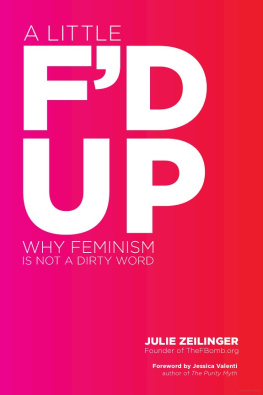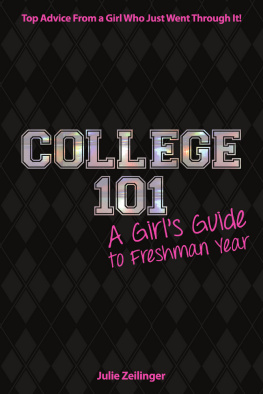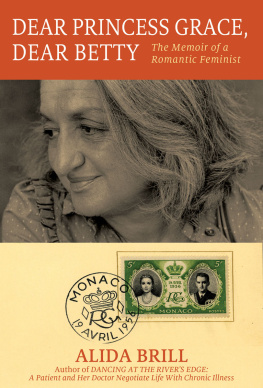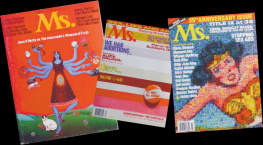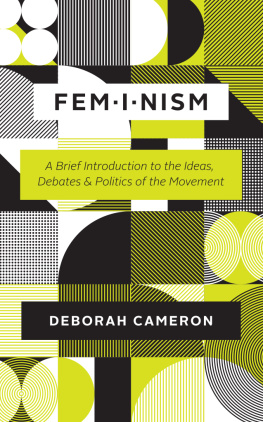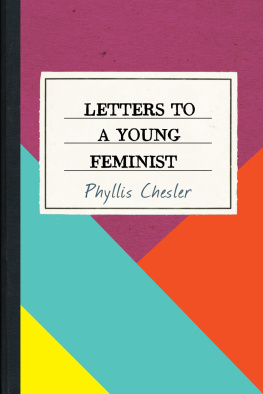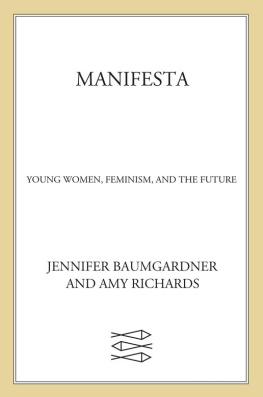Table of Contents
For Cathy, Scott, and Brian Zeilinger, the most incredible and supportive family in the entire world.
FOREWORD
I can tell a lot about a person based on what they do when I first tell them Im a feminist.
Some people will give you a skeptical look and say something along the lines of, But you dont look like a feminist. These are the folks you can maybe talk some sense to, if theyre open to hearing why anti-feminist stereotypes are so old school and ridiculous. Then there are the people (mostly men) who will feign fear and say, Oooh, are you going to hit me? or some other such nonsense that suggests youre too angry for your own good. These are people to avoid at all costs. Then there are the keepersthe folks who say, Tell me more, or, Whats that like? Those are the people that make my day. My year!
But stereotypes are damaging all aroundand making judgments about peoples reaction to the word or idea of feminism can be a mistake, too. Sometimes people will surprise you.
A young Australian man I met while I was traveling responded to my telling him I was a feminist by actually lifting my arm and looking underneath for armpit hair . Not a good sign; I thought for sure he was an irredeemable asshole. But, after some time getting to know each other outside of bizarre first impressions, we ended up becoming great friends and still keep in touch almost ten years later. The truth is, for a lot of peopleeven good, smart, well-intentioned peoplefeminism is a dirty word. Or a funny word. Or a scary one.
This isnt just the case for younger people, either (despite the stereotypes that its young women who dont call themselves feminists). People who are wary of feminism come in all ages. Often these folks dont really know what feminism is about. Theyve maybe heard the bra-burning myth or seen mainstream media portrayals of feminists and have been put off. Or theyre nervous about seeming uninformed about gender issues so they become defensive. Sometimes people have really good reasons for reacting negatively to the label feminism. The movements focus on white, cis, middle-class issues has left a lot of people, rightfully, skeptical or hurt. Its a reality we cant ignore.
Feminists and people who care about gender justice need to take a close look why feminism is still so disparaged, no matter what the reason. In large part, its because theres been a well-organized social and political antifeminist movement dedicated to making sure that people, women especially, eschew the feminism and the ideas behind it. Whether its conservative radio hosts calling feminists feminazis or right-wing womens organizations suggesting that equality actually hurts women, theres a reason that so many people think so little of a movement that has done so much good.
The newest form of feminist-bashing is a bit more insidious than just straight up calling us frigid manhaters. In the last couple of years, instead of completely dismissing feminism, antifeminist groups have started calling themselves the real feminists. Groups like the Independent Womens Forumwho try to ban The Vagina Monologues on college campuses and argue that pay inequity doesnt existhave figured out that the feminist label has power, and theyre trying to co-opt it.
This is why Im so glad that Julie has written this book. In a time when the very definition of feminism is up for grabs, when people who are feminists wont identify as such and people who are most definitely not feminists are trying to steal the language of the movement, we need a voice that gets past the bullshit. A clear, strong, young voice that lets people know what feminism is actually about. We have a lot of those voices online, so its great to start to see some in print as well!
At the end of the day, whatever someones reason for giving feminism the side-eye, what gives me hope is the knowledge that theres space for conversation, for listening, and for making connections with other people that can lead to a better, more just world. No matter what someones initial reaction is to feminism, theres room for growth and actionwhat more could we want?
JESSICA VALENTI
INTRODUCTION
S o. Im a teenager and I wrote a book. And not just any book. A book about feminism.
What kind of obviously pretentious and generally ridiculous teen does that?
Well, Im actually pretty typical. I grew up in Pepper Pike, Ohio, (seriously) and went to a small school that worshiped football, but if we had actually won a game, I think I wouldve immediately begun to collect canned goods and survival gear in preparation for the clearly imminent rapture. I have a hilarious older brother, two loving and supportive parents, and a dog who thinks hes a cat. I also started the FBomb: a loud, proud, snarky blog for young feminists that is read by hundreds of thousands of people from all over the world.
So how could a (relatively) normal young girl from Ohio (who, as we all know, should really be obsessed with boys, clothes, and ABC Family original programming) be both a regular teen and a prominent teenage feminist?
It all started in the eighth grade. For decades, my middle school has upheld the tradition of requiring all eighth graders to write a speech on a topic of their choice and deliver it to the entire school.
Now, to a bunch of fourteen-year-olds who just want to look cute in their skin-tight Abercrombie jeans, and who are constantly worried theres food stuck in their blue-and-magenta braces, standing in front of every single one of their peers and speaking publicly for ten minutes is terrifying, to say the least.
In sixth and seventh grade, kids are already starting to worry about the chapel talk. They mention it in hushed tones, quickly spat out, before changing the subject so as to not linger on its imminent reality. The schools obviously satanic teachers refer to it as a public-speaking opportunity. But to 99.9 percent of eighth graders, its really more like an opportunity to confirm our worst suspicions: that everybody is judging us, and only us. Anyway, at that point in our young lives, we are all planning on becoming things like Rihannas backup dancers or professional dirt bikers, so obviously public speaking is a completely superfluous skill.
I tried to think positively about my speech. Despite the feeling of imminent doom, I realized that as a fourteen-year-old, it is incredibly difficult to get anyone to listen to you talk about anything serious for more than thirty seconds. And here I was, being handed a full ten minutes. I may have been terrified, but dammit, I was going to use those precious minutes. I was going to enlighten my audience of tweens and move them to greater social action. Local news organizations were going to be called to the scene after my talk, which was going to incite my prepubescent peers to riot against the newly revealed injustices of the world. I was going to give the best speech ever that is, if I did not spontaneously throw up midspeech, which was also a real possibility.
Around the same time, my mom handed me an article she found in a copy of Glamour magazine while in the dentists waiting room. (Yeah, she stole it. So sue her. You made her wait forty minutes to get her teeth cleaned. Call it even. ) It was titled A Generation of Women Wiped Out? The article was about women in South Asia, particularly in India, who were killing their own baby girls just because of their disappointing gender.
Needless to say, I was deeply disturbednot only by the horrific facts Id been presented with, but also by the fact that neither I, nor anybody I knew, had even been aware that thousands of baby girls die every year because of this. And so I decided to write my speech about female feticide and infanticide, and I started pouring over the research. As it often happens, my research led me to all kinds of related issues, and I soon realized there were many more atrocities being committed against women all over the worldand even in my own country. And I kept thinking, This cant be happening. If this were happening, everybody would be talking about it. I would have heard of it before. Everybody would be horrified. It would be on the news. But when I checked the news, I saw only that Paris Hilton had bought her forty-seventh Chihuahua and that another married politician was wrapped up in a sex scandal.

